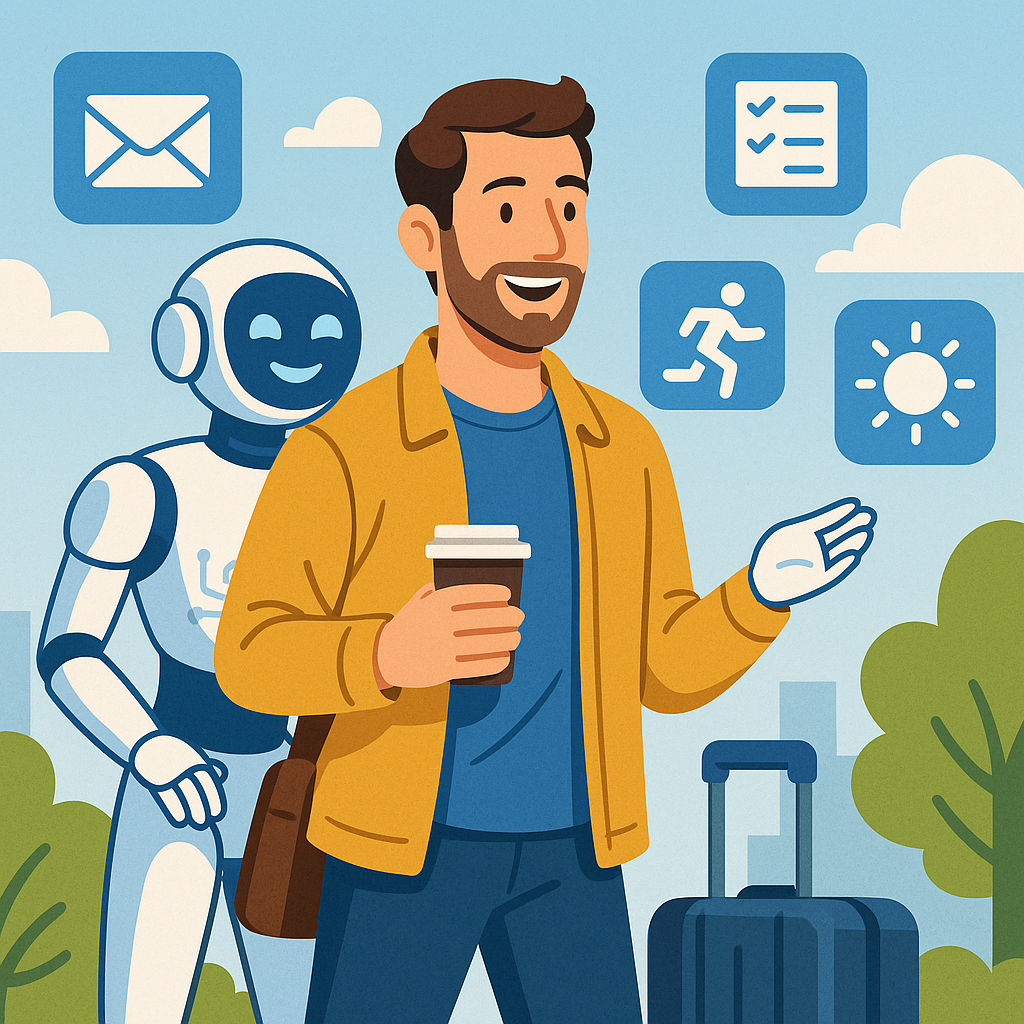The Invisible Power of AI Around You
Artificial Intelligence (AI) has become more than just a tech buzzword—it’s a silent partner that helps millions of people manage, improve, and simplify their lives. Whether it’s recommending your next Netflix show, optimizing your daily route, or reminding you to drink water, AI is seamlessly woven into your everyday experiences. But the real potential of AI lies in how you can use it consciously to thrive, not just survive—boosting productivity, well-being, and creativity.
1. AI in Time and Task Management
One of AI’s most practical uses is time optimization. With countless tasks competing for your attention, AI tools help you prioritize what matters most.
Examples:
- Google Assistant and Siri schedule appointments, send reminders, and help organize daily routines.
- Notion AI and Todoist analyze your task lists and suggest ways to optimize your schedule.
How It Helps:
- AI ensures you never miss deadlines or meetings.
- Smart assistants learn your habits to reduce decision fatigue.
- You gain more time for personal growth, family, and creativity.
2. AI in Personal Health and Fitness
AI isn’t just digital—it’s personal. It helps track your health, sleep, and nutrition, and even predicts potential issues before they arise.
Examples:
- Fitbit and Apple Health use AI to analyze movement, heart rate, and sleep patterns, offering real-time feedback.
- MyFitnessPal recommends meal plans based on your health goals.
How It Helps:
- AI monitors your physical activity and motivates you to stay active.
- It identifies unhealthy habits before they become problems.
- Personalized health advice keeps your body and mind in sync.
3. AI in Financial Management
AI also plays a key role in helping adults manage their money wisely. With automation and data-driven insights, AI can help you save more and spend smarter.
Examples:
- Cleo and Mint analyze spending patterns and provide budgeting recommendations.
- AI investment platforms like Betterment offer smart, automated portfolio management.
How It Helps:
- AI provides detailed financial reports and spending breakdowns.
- It offers personalized advice for saving or investing.
- Smart alerts prevent overspending and guide you toward financial wellness.
4. AI in Creativity and Self-Expression
From art and music to writing and video creation, AI has become a creative partner for individuals in all fields.
Examples:
- ChatGPT helps generate story ideas, essays, and creative content.
- Canva AI and Runway ML simplify graphic and video creation with intuitive prompts.
- Soundraw and AIVA compose music based on your mood or genre preferences.
How It Helps:
- AI tools reduce creative barriers and bring imagination to life.
- It enhances productivity for artists, designers, and writers.
- Anyone can explore creativity without advanced technical skills.
5. AI in Learning and Personal Development
AI makes learning faster, more personalized, and interactive. Whether you want to pick up a new skill or deepen existing knowledge, AI-powered platforms tailor content to your learning style.
Examples:
- Duolingo uses AI to adapt language lessons to your strengths and weaknesses.
- Coursera and LinkedIn Learning recommend courses based on your career goals.
- ChatGPT can act as a tutor—explaining complex topics in simple terms.
How It Helps:
- AI enables lifelong learning at your own pace.
- It identifies skill gaps and recommends focused improvement areas.
- It supports students, professionals, and adults aiming to stay competitive.
6. AI in Home and Lifestyle
Your home is smarter than ever, thanks to AI. It can enhance comfort, safety, and sustainability through intelligent automation.
Examples:
- Alexa or Google Home control lights, thermostats, and appliances.
- Nest adjusts your home temperature automatically for energy efficiency.
- AI security systems recognize family members and alert you to unusual activity.
How It Helps:
- AI simplifies household management.
- It creates an eco-friendly, cost-effective living environment.
- Smart homes offer convenience, comfort, and peace of mind.
7. The Responsible Use of AI in Daily Life
While AI brings convenience, it’s crucial to use it responsibly. Over-dependence can lead to privacy concerns, reduced critical thinking, and data misuse.
Best Practices:
- Be mindful of what data you share with AI platforms.
- Use AI as a tool for improvement, not a replacement for effort.
- Verify information from AI tools to avoid misinformation.
Why It Matters:
Responsible use ensures AI empowers rather than controls you, allowing you to grow with technology, not depend on it blindly.
Conclusion: Thriving with AI, Not Competing Against It
AI is not just about automation—it’s about amplification. It enhances your decision-making, health, creativity, and emotional well-being. By embracing AI thoughtfully, adults can create a balanced, efficient, and fulfilling lifestyle. In the end, the smartest way to live with AI is not to fear it, but to collaborate with it—because the future belongs to those who know how to use intelligence, both human and artificial, wisely.

